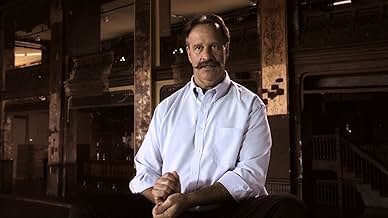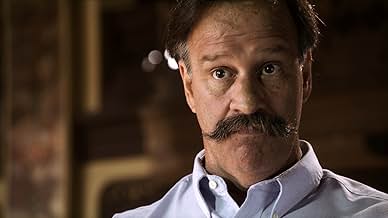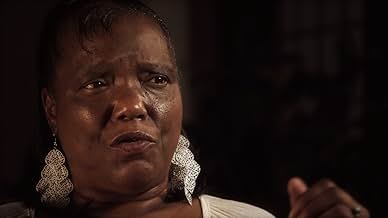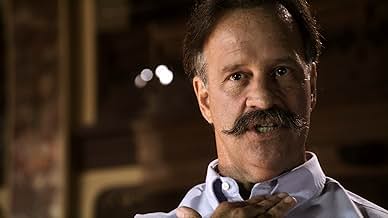ÉVALUATION IMDb
6,3/10
2,2 k
MA NOTE
Ajouter une intrigue dans votre langueAn experimental documentary that uses archival footage, interviews, and fictionalized scenarios to tell the story of the people around Jeffrey Dahmer, during the summer of his arrest in 1991... Tout lireAn experimental documentary that uses archival footage, interviews, and fictionalized scenarios to tell the story of the people around Jeffrey Dahmer, during the summer of his arrest in 1991.An experimental documentary that uses archival footage, interviews, and fictionalized scenarios to tell the story of the people around Jeffrey Dahmer, during the summer of his arrest in 1991.
- Director
- Writers
- Stars
- Prix
- 1 victoire et 2 nominations au total
Tom Ashbrook
- Radio Show Host
- (voice)
Jeffrey Dahmer
- Self
- (archive footage)
Avis en vedette
THE JEFFERY DAHMER FILES (dir. Chris James Thompson) A startlingly original dramatization and documentary about infamous Milwaukee serial killer, Jeffery Dahmer. The film features conversations with three interviewees; the detective who had first contact with Dahmer, the middle- aged, Afro American woman who was Dahmer's neighbor in the apartment building where his crimes were committed, and the medical examiner on the case. The fictionalized sections of the film augment and enhance the interrogative segments, and make this an authentic dramatic production and not just a series of interviews with 'talking heads'. The film is not even eighty minutes, but it is superbly edited and a brilliant example of documentary film-making. Well Worth a Look.
Jeff had its world premiere at the SXSW Film Festival. The film paints an intriguing, even provocative, portrait on a man whose actions place him among pantheon of the most evil figures of our times alongside the Nazis in our collective memory. The use of interviews with a neighbor, a police investigator and a medical examiner paints a compelling picture of the events surrounding the arrest and prosecution of Jeffrey Dahmer. They also show us how the revelation of his crimes affected those around him. The interviews paint a powerful picture and deliver a solid portrait of the serial killer that provides us with interesting insights into Dahmer's twisted mind and personality.
However, the other aspect of Jeff is more problematic. The director felt the need to supplemental the interviews by recreating everyday aspects of Dahmer's life using actors to show bits and pieces of his daily life as he shops for stuff that he'll need to carry out his vicious crimes. These scenes present the absolute ordinariness and in-distinctiveness of Dahmer. The phrase that kept going through my mind was Hannah Arendt's famous phrase "the banality of evil" which she used to describe Adolf Eichmann during his Israeli war crimes trial. The director and writers seem to be trying to do something similar in this film. The problem is that in so doing they are taking the dangerous step of merging fact and fiction. It is unclear whether they are attempting to recreate actual events or just imagine how Dahmer might have behaved based on their own speculations. The line between reality and imagination has becomes very blurry when you mix documentation with dramatization.
However, the other aspect of Jeff is more problematic. The director felt the need to supplemental the interviews by recreating everyday aspects of Dahmer's life using actors to show bits and pieces of his daily life as he shops for stuff that he'll need to carry out his vicious crimes. These scenes present the absolute ordinariness and in-distinctiveness of Dahmer. The phrase that kept going through my mind was Hannah Arendt's famous phrase "the banality of evil" which she used to describe Adolf Eichmann during his Israeli war crimes trial. The director and writers seem to be trying to do something similar in this film. The problem is that in so doing they are taking the dangerous step of merging fact and fiction. It is unclear whether they are attempting to recreate actual events or just imagine how Dahmer might have behaved based on their own speculations. The line between reality and imagination has becomes very blurry when you mix documentation with dramatization.
Everyone knows it was APT 213, but they had it as 214 in these really bad dramatizations/recreations that are cut in between interviews which makes for a bad format. It would be better just with the interviews.
This starts off very slow to the point that I almost turned it off after a few minutes. However, when I saw that one of the speakers was the lead investigator on the Dahmer case, I continued to watch for a little while longer. And it was then that the documentary got interesting. This short movie follows the story of the lead investigator who interrogated Dahmer during his confession and how he corroborated with forensic investigators to determine just how many people Dahmer had killed. The deceive's and forensic's stories are good. The other chunk of the documentary interviews Dahmer's neighbor and a few others who knew him and their experience during his arrest. Although it offers another story/point of view to the case, it ultimately was not needed and made the picture feel slow and lackluster. The final chunk follows an actor playing the role of Dahmer just shopping and walking around so just reenacting his everyday life. This was absolutely a waste of footage and time. More footage of the Dahmer case would have been better to show in it's place.
Chris James Thompson's Jeff, a docudrama involving the interworkings of the Jeffrey Dahmer case, opens by establishing two different, vital points for a film like this to make. It has the medical examiner, Jeffrey Jentzen, assigned to the case of Jeffrey Dahmer state how many people have formulated different meanings behind what exactly a "disaster" is, and then has leading detective on the case, Patrick Kennedy, go into how as human beings we'd love to believe we'd react courageously in the face of tragedy or despair, but we can never be certain until it happens. He then goes on to state how as a devout Catholic, he was always thought that courage is fear that said its prayers.
All I can say is that fear can pray all it wants, but it could never have prepared itself for the horror Dahmer inflicted not only on a community but on a country as a whole. Jeff dives into three people, all of them deeply effected by Dahmer's actions in some way, and spliced in are scenes recreated to show Dahmer's day-to-day life, as mundane as it is, with the man in question played wonderfully by Andrew Swant. The three people, however, are not actors, and are here to share their depressingly grim accounts of their relationship with Dahmer. The medical examiner is Jeffrey Jentzen and the leading detective is Patrick Kennedy, as established, and but the third person was the most personally affiliated with the man and that is Pamela Bass, who was the next door neighbor to Dahmer in his apartment for many years.
The film explores how deeply this one unexplainable murder case completely changed the lives of three normal, innocent, law-abiding people and how they've gone on to better or further their lives based on this case alone. Pat Kennedy, easily the one with the biggest story to tell due to his explicit connection with Dahmer during the time of his arrest, conviction, and jail-life, goes into how when he first met the man, they talked in lengthy detail about religion and alcoholism. This was during the time that a skeleton was found in his refrigerator, so says Kennedy, who recalls his thoughts and mindset as he discovers there was not just one but six skulls found in Dahmer's refrigerator, among other severed body parts in containers, drums, and jars that lied throughout the home of Dahmer.
This is one of the most unique documentary films I've ever seen, with a style very similar to that of Richard Linklater's Bernie, which featured polarizing performances by Jack Black, Matthew McConaughey, and Shirley McClaine. It takes the same kind of mockumentary approach that film did, featuring reenactments and authentic interviews from various townspeople who knew the suspect in question. However, this film has less of a mock-narrative consistency than Bernie, with the scenes featuring Dahmer involving little dialog and emphasizing on the mundane activities of the man behind washed-out cinematography and often low-key music. This is the stylistic side of the picture, which is very innocent and unobtrusive to its central focus. Next to Quentin Dipeux's Wrong, this is easily some of the best cinematography and stylistic merits a film has had this year, only this time, the traits are embodied in a film that is much more watchable and clear in its tone.
Jentzen goes into the grim details of investigating and gutting the apartment, and being put to the painstaking task of identifying all the bodies removed from the apartment. It was a tireless project, seeing as how not only were the bodies dismembered and mutilated, but they had begun decomposing, leaving much of the reliance on small facial details and anatomy structure to identify them. Finally, Bass goes into how she was effected simply for being her neighbor. The apartments and their always reeked of death for weeks on end, and she and her building were the target of public scrutiny and attention, with numerous people asking if they could come in to sit on couch Dahmer gave her or touch a glass Dahmer once drank out. We begin to question that, besides Dahmer, who else was sick in this whole equation.
There is no better way to describe Jeff than a complete film than a subtle and low-key crime drama. Everything about it is an exercise is subtle, minimalist filmmaking that accentuates drama, uncertainty, and impending doom with true craft, from a filmmaker who clearly has a long road to travel on before he can even give us, what I believe, is half of what he wants to say. If there's any film that should be shown to film students as a look at what a first-time auteur looks like, this is it.
One of the best and most thought-provoking scenes is the scene where Jentzen reveals that he doesn't go to horror movies and can't see why people would want to. The last horror film he saw was The Exorcist, likely in its original theatrical run in 1973. He doesn't feel the need to watch anymore. Why would he? He lived a horror film and there's no "stop" button on his.
Starring: Andrew Swant, Pamela Bass, Jeffrey Jentzen, and Pat Kennedy. Directed by: Chris James Thompson.
All I can say is that fear can pray all it wants, but it could never have prepared itself for the horror Dahmer inflicted not only on a community but on a country as a whole. Jeff dives into three people, all of them deeply effected by Dahmer's actions in some way, and spliced in are scenes recreated to show Dahmer's day-to-day life, as mundane as it is, with the man in question played wonderfully by Andrew Swant. The three people, however, are not actors, and are here to share their depressingly grim accounts of their relationship with Dahmer. The medical examiner is Jeffrey Jentzen and the leading detective is Patrick Kennedy, as established, and but the third person was the most personally affiliated with the man and that is Pamela Bass, who was the next door neighbor to Dahmer in his apartment for many years.
The film explores how deeply this one unexplainable murder case completely changed the lives of three normal, innocent, law-abiding people and how they've gone on to better or further their lives based on this case alone. Pat Kennedy, easily the one with the biggest story to tell due to his explicit connection with Dahmer during the time of his arrest, conviction, and jail-life, goes into how when he first met the man, they talked in lengthy detail about religion and alcoholism. This was during the time that a skeleton was found in his refrigerator, so says Kennedy, who recalls his thoughts and mindset as he discovers there was not just one but six skulls found in Dahmer's refrigerator, among other severed body parts in containers, drums, and jars that lied throughout the home of Dahmer.
This is one of the most unique documentary films I've ever seen, with a style very similar to that of Richard Linklater's Bernie, which featured polarizing performances by Jack Black, Matthew McConaughey, and Shirley McClaine. It takes the same kind of mockumentary approach that film did, featuring reenactments and authentic interviews from various townspeople who knew the suspect in question. However, this film has less of a mock-narrative consistency than Bernie, with the scenes featuring Dahmer involving little dialog and emphasizing on the mundane activities of the man behind washed-out cinematography and often low-key music. This is the stylistic side of the picture, which is very innocent and unobtrusive to its central focus. Next to Quentin Dipeux's Wrong, this is easily some of the best cinematography and stylistic merits a film has had this year, only this time, the traits are embodied in a film that is much more watchable and clear in its tone.
Jentzen goes into the grim details of investigating and gutting the apartment, and being put to the painstaking task of identifying all the bodies removed from the apartment. It was a tireless project, seeing as how not only were the bodies dismembered and mutilated, but they had begun decomposing, leaving much of the reliance on small facial details and anatomy structure to identify them. Finally, Bass goes into how she was effected simply for being her neighbor. The apartments and their always reeked of death for weeks on end, and she and her building were the target of public scrutiny and attention, with numerous people asking if they could come in to sit on couch Dahmer gave her or touch a glass Dahmer once drank out. We begin to question that, besides Dahmer, who else was sick in this whole equation.
There is no better way to describe Jeff than a complete film than a subtle and low-key crime drama. Everything about it is an exercise is subtle, minimalist filmmaking that accentuates drama, uncertainty, and impending doom with true craft, from a filmmaker who clearly has a long road to travel on before he can even give us, what I believe, is half of what he wants to say. If there's any film that should be shown to film students as a look at what a first-time auteur looks like, this is it.
One of the best and most thought-provoking scenes is the scene where Jentzen reveals that he doesn't go to horror movies and can't see why people would want to. The last horror film he saw was The Exorcist, likely in its original theatrical run in 1973. He doesn't feel the need to watch anymore. Why would he? He lived a horror film and there's no "stop" button on his.
Starring: Andrew Swant, Pamela Bass, Jeffrey Jentzen, and Pat Kennedy. Directed by: Chris James Thompson.
Le saviez-vous
- AnecdotesWon the Milwaukee Film Festival's Cream City Cinema Grand Jury Award for 2012.
- GaffesWhen Dahmer is purchasing alcohol in the convenient store, the "WE CARD" sticker on the freezer to the right says the "born on this date" year to purchase alcohol is 1990.
- Bandes originalesStill Light
Performed by The Knife
Meilleurs choix
Connectez-vous pour évaluer et surveiller les recommandations personnalisées
- How long is The Jeffrey Dahmer Files?Propulsé par Alexa
Détails
Contribuer à cette page
Suggérer une modification ou ajouter du contenu manquant


























